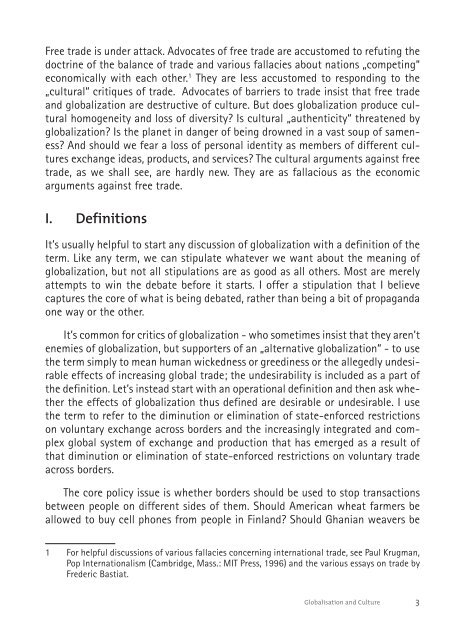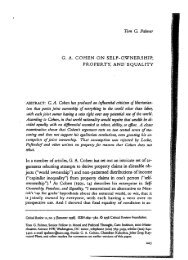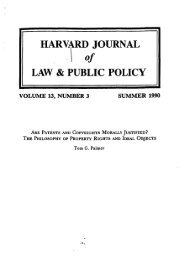Globalization and Culture - Tom G. Palmer
Globalization and Culture - Tom G. Palmer
Globalization and Culture - Tom G. Palmer
Create successful ePaper yourself
Turn your PDF publications into a flip-book with our unique Google optimized e-Paper software.
Free trade is under attack. Advocates of free trade are accustomed to refuting the<br />
doctrine of the balance of trade <strong>and</strong> various fallacies about nations „competing“<br />
economically with each other. 1 They are less accustomed to responding to the<br />
„cultural“ critiques of trade. Advocates of barriers to trade insist that free trade<br />
<strong>and</strong> globalization are destructive of culture. But does globalization produce cultural<br />
homogeneity <strong>and</strong> loss of diversity? Is cultural „authenticity“ threatened by<br />
globalization? Is the planet in danger of being drowned in a vast soup of sameness?<br />
And should we fear a loss of personal identity as members of different cultures<br />
exchange ideas, products, <strong>and</strong> services? The cultural arguments against free<br />
trade, as we shall see, are hardly new. They are as fallacious as the economic<br />
arguments against free trade.<br />
I. Definitions<br />
It’s usually helpful to start any discussion of globalization with a definition of the<br />
term. Like any term, we can stipulate whatever we want about the meaning of<br />
globalization, but not all stipulations are as good as all others. Most are merely<br />
attempts to win the debate before it starts. I offer a stipulation that I believe<br />
captures the core of what is being debated, rather than being a bit of propag<strong>and</strong>a<br />
one way or the other.<br />
It’s common for critics of globalization - who sometimes insist that they aren’t<br />
enemies of globalization, but supporters of an „alternative globalization“ - to use<br />
the term simply to mean human wickedness or greediness or the allegedly undesirable<br />
effects of increasing global trade; the undesirability is included as a part of<br />
the definition. Let’s instead start with an operational definition <strong>and</strong> then ask whether<br />
the effects of globalization thus defined are desirable or undesirable. I use<br />
the term to refer to the diminution or elimination of state-enforced restrictions<br />
on voluntary exchange across borders <strong>and</strong> the increasingly integrated <strong>and</strong> complex<br />
global system of exchange <strong>and</strong> production that has emerged as a result of<br />
that diminution or elimination of state-enforced restrictions on voluntary trade<br />
across borders.<br />
The core policy issue is whether borders should be used to stop transactions<br />
between people on different sides of them. Should American wheat farmers be<br />
allowed to buy cell phones from people in Finl<strong>and</strong>? Should Ghanian weavers be<br />
1 For helpful discussions of various fallacies concerning international trade, see Paul Krugman,<br />
Pop Internationalism (Cambridge, Mass.: MIT Press, 1996) <strong>and</strong> the various essays on trade by<br />
Frederic Bastiat.<br />
Globalisation <strong>and</strong> <strong>Culture</strong> 3











